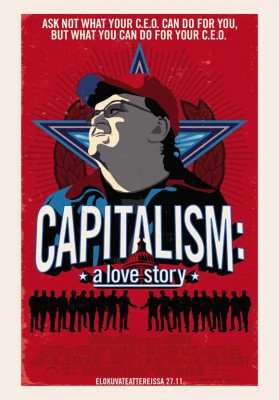| Reviews & Columns |
|
Reviews DVD TV on DVD Blu-ray 4K UHD International DVDs In Theaters Reviews by Studio Video Games Features Collector Series DVDs Easter Egg Database Interviews DVD Talk Radio Feature Articles Columns Anime Talk DVD Savant Horror DVDs The M.O.D. Squad Art House HD Talk Silent DVD
|
DVD Talk Forum |
|
|
| Resources |
|
DVD Price Search Customer Service #'s RCE Info Links |
|
Columns
|
|
|
Capitalism: A Love Story
"I believe that banking institutions are more dangerous to our liberties than standing armies." - Thomas Jefferson
There were a number of reasons why I decided to move to Japan about seven years ago. One of these reasons is the subject of Michael Moore's Capitalism: A Love Story (2009) a typically fine editorial-style documentary by the Michigan-born (like me) filmmaker, for whom there seems no middle ground. And yet the movie's strengths are the same as in all of Moore's films: he straightforwardly presents lots of thoroughly researched, widely documented information, much of it flatly indefensible examples of appalling inhumanity. In this case ordinary people of all kinds - middle and lower class, urban and rural folk - who are victimized by unchecked capitalistic greed run amuck. The picture is not an unqualified success; late in the film Moore hedges his bets with trademark shtick that it doesn't really need, and the hopeful, take-action conclusion is in some ways hard to accept. But it's an important film every American should see for themselves, to drawn their own conclusions from the case Moore makes against the present system.
Near the end of the film, Moore vows to fight for change because, he says, "I Ain't Leaving." Well, I did. I left for myriad reasons, but one not-insignificant one was that I could see the writing on the wall, that the Federal government couldn't sustain year-after-year of tax cuts for the rich and big corporations while increasing the deficit. On a more personal level, nearly everyone I knew was refinancing their mortgage or racking up high interest credit card debt to the tune of $5,000-$25,000 while their health insurance, retirement packages, and job security gradually vanished. It was like Kurt Vonnegut's novel Galápagos, in which the world comes to an end not by some wayward meteor or alien invasion, but rather the result of a global financial crisis.
Conversely, a few years after moving to Kyoto, in my forties I came down with chicken pox. I never had it as a child, and what they say about catching it as an adult is absolutely true. I was in agony. My temperature soared to something like 104.6 degrees. My wife was away on a business trip, and because I couldn't stand up unaided much less drive myself to the hospital, I had an ambulance come and get me. I was treated in the emergency room, recovered in a private room, was given lots of medication to reduce my fever and after three days and three nights was finally released. The total bill? About $175. (The ambulance ride was free. They always are here.) The tab would have been about the same at any hospital, but as luck would have it, the ambulance took me to - Gasp! - a communist hospital. And there I received the same high level of care I would have in an American hospital - but for about 1% of the cost.*
At this point some of you may be thinking that I'm reviewing the wrong movie, that this anecdote would be more appropriate to Michael Moore's Sicko, but for-profit medical care is symptomatic of the problems likewise found in Capitalism: A Love Story. Indeed, here Moore reminds the viewer of Dr. Jonas Salk's altruism: after developing a vaccine for polio he gave up all rights to its patent for the public good, an act of selflessness almost unthinkable today.
Contrastingly, a for-profit juvenile detention facility leads to the same kind of abuses as for-profit insurance companies and drug manufacturers charging exorbitant prices or denying care outright. As Moore shows, a greedy judge getting kickbacks from the company running the facility has every reason to send as many hapless teenagers as he can to kiddie prison, for as long as possible. It's a nightmare, the kind of thing we Americans used to only imagine could happen in faraway places like Turkey or Albania: some teen has an everyday, typical teenager-type argument with his parents at the dinner table and the next thing you know he's doing hard time in the slammer, locked away for six, nine, or maybe even 12 months with no recourse. The longer the better, because that's more dough the facility can charge taxpayers.
Though Moore was a funny, David vs. Goliath-type presence in his first film, Roger & Me** and later on his wonderful TV show The Awful Truth, except for The Big One (in which he's supposed to be at the center of things) he tends to overwhelm his feature films and they generally play better with him off-camera most of the time. That's true of the first-third or so of Capitalism; these scenes are especially powerful because the horror of what unfolds in front of the nonjudgmental camera speaks for itself. Ordinary people who in some cases have lived in the same home for decades are unceremoniously evicted, leaving behind decimated neighborhoods that resemble Warsaw at the end of World War II. Think it won't happen to you? I've got two sisters: one, recently widowed, lost her home just like the people in this movie, while the other has come awfully close to the same fate.
The scurrilous practices of deregulated conglomerates are indefensible. Some gamble on the very lives of its employees, secretly buying life insurance policies hoping to profit from their untimely deaths (in legalese the insured are called "dead peasants"), revenue they stick into their pockets while leaving grieving families to pay medical bills and funeral costs on their dime. A leaked internal memo sent by Citigroup to its major stockholders gloats that the United States has become a "plutonomy" where the richest 1% are wealthier and more powerful than the bottom 99% combined - suggesting that it was regrettable the latter still had the right to vote.
As usual, armed with a barrage of well-chosen stock shots Moore and his team of editors make biting comparisons throughout, this plutonomy to Ancient Rome before its fall (with Dick Cheney as its Caesar). Trying to explain why so many lower-income Americans support tax breaks for the rich and the myth that their such support will enable them to become rich themselves, Moore uses stock footage of a dog begging at the dinner table, maniacally jumping up and down trying to be noticed but ignored and receiving nothing for its efforts. It's an effective comparison.
Through it all, Moore doesn't hesitate in naming the worst offenders, among them Wal-Mart, Proctor & Gamble, Bank of America, Citibank, Countrywide Financial, Chase, Goldman-Sachs, and AIG. Moore praises the insight of Franklin Roosevelt and Jimmy Carter (quoting from the latter's brave if politically disastrous 1979 speech: "In a nation that was proud of hard work, strong families, close-knit communities, and our faith in God, too many of us now tend to worship self-indulgence and consumption. Human identity is no longer defined by what one does, but by what one owns.") But he also reserves particular scorn for Democratic Senator Chris Dodd and Obama's Treasury Secretary, Tim Geithner.
Intriguingly, leaders in the Catholic Church (to which Moore belongs) become unexpected Good Guys in all this, priests and bishops who flatly regard capitalism as a sin, contrary to the teachings of Christ.
The film tries to end on a hopeful note, citing examples of small companies where the employees have more control and more equitable salaries and benefits, and an ultimately successful, old-fashioned sit-down strike echoing the landmark one Moore's uncle participated in back in Flint 75 years ago. Despite this, it's hard not to walk away from Capitalism informed but dispirited, especially after events like the Supreme Court decision in January to allow corporations to spend unlimited funds on behalf of political candidates. The film's optimistic ending is in some ways gratifying, but it's hard to imagine things getting better any time in the near future.
Video & Audio
Filmed in high-definition video Capitalism: A Love Story looks better on Blu-ray that it probably did in its 35mm theatrical run. The barrage of stock footage is variable but a lot of it too looks great in high-def. (Moore got his hand on high-def masters from several Ronald Reagan pictures, notably Law and Order and The Killers. I'd sure like to see those in their entirety on Blu-ray.) The Dolby TrueHD 5.1 mix is exceptional, like other recent Michael Moore films, with especially good use of popular music. Optional English and Spanish subtitles are included.
Extra Features
Beyond a teaser and regular trailer, both in high-def, the primary supplement is a collection of 11 deleted/extended scenes (also in HD) typically running between five and ten minutes each, and which are as interesting as anything in the longish (125-minute) feature. Also included is a digital copy of the film on a separate disc which can be uploaded into portable media devices.
Parting Thoughts
Of Moore's feature documentaries so far Capitalism: A Love Story falls somewhere in the middle, working best when it focuses on the personal impact its abstract subject matter has had on ordinary Americans, and less well when Moore falls back on material done better before. Still, this is still a must-see film and a DVD Talk Collector Series title.
* But-but-but you say, surely your taxes must be through the roof? No, the average Japanese pays 1% lower income taxes than the average American.
** Whose premiere, coincidentally, I covered for the Ann Arbor News, at a multiplex just outside Flint, Michgan because, famously, all of Flint's movie theaters had gone out of business.
Stuart Galbraith IV's latest audio commentary, for AnimEigo's Tora-san DVD boxed set, is on sale now.
|
| Popular Reviews |
| Sponsored Links |
|
|
| Sponsored Links |
|
|
| Release List | Reviews | Shop | Newsletter | Forum | DVD Giveaways | Blu-Ray | Advertise |
|
Copyright 2024 DVDTalk.com All Rights Reserved. Legal Info, Privacy Policy, Terms of Use,
Manage Preferences,
Your Privacy Choices | |||||||













